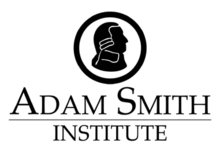 | |
| Abbreviation | ASI |
|---|---|
| Formation | 1977 |
| Type | think tank |
| Headquarters | London, SW1 United Kingdom |
| Coordinates | 51°29′52″N 0°07′46″W / 51.4979°N 0.1294°W |
Chairman | James Lawson |
President | Madsen Pirie |
Director | Eamonn Butler |
| Funding | Undisclosed, some funding from the tobacco industry |
| Website | adamsmith |
The Adam Smith Institute (ASI) is a UK-based neoliberal think tank and lobbying group, named after Adam Smith, a Scottish moral philosopher and classical economist.[1][2][3] The Institute advocates free market and classical liberal ideas, primarily via the formation of policy options with regard to public choice theory, which political decision makers seek to develop upon. ASI President Madsen Pirie has sought to describe the activity of the organisation as "[w]e propose things which people regard as being on the edge of lunacy. The next thing you know, they're on the edge of policy".[4]
The ASI formed the primary intellectual force behind the privatisation of state-owned industries during the premiership of Margaret Thatcher,[5][better source needed] and alongside the Centre for Policy Studies and Institute of Economic Affairs advanced a neoliberal approach toward public policy on privatisation, taxation, education and healthcare.[6] A number of the policies presented by organisation were adopted by the administrations of John Major and Tony Blair and members of the ASI have also advised non-United Kingdom governments.[7][8] Beyond policy development, the organisation advocates free market ideas through the publication and distribution of literature, the promotion of Tax Freedom Day, the hosting of speaker events for students and young people, media appearances and blogging.
The ASI is rated as one of the least transparent think tanks in the United Kingdom in relation to funding and has been shown to receive funding from the tobacco industry.[9][10]
- ^ Jones, Bill, ed. (1999). Political Issues in Britain Today (5th ed.). Manchester: Manchester University Press. p. 6. ISBN 0719054311.
- ^ Kandiah, Michael David; Seldon, Anthony, eds. (2013). Ideas and Think Tanks in Contemporary Britain. New York: Routledge. p. 77. ISBN 978-0714647432.
- ^ Gilligan, Andrew (15 September 2012). "'Poverty barons' who make a fortune from taxpayer-funded aid budget". The Daily Telegraph. Retrieved 12 January 2016.
- ^ Rusbridger, Alan (22 December 1987). "Adam Smith Institute's sense and nonsense". The Guardian. p. 30. Retrieved 19 January 2010.
- ^ "Private Ayes". The Dallas Morning News. 5 January 1986. p. 38.
- ^ "Britain weighs pleas to cut capital-gains and inheritance taxes". The Wall Street Journal. 6 February 1989.
- ^ "Menem asks Adam Smith Institute for privatisation advice". The Guardian. 13 November 1989.
- ^ Denham, Andrew; Garnett, Mark (January 1999). "Influence without responsibility? Think-tanks in Britain". Parliamentary Affairs. 51 (1): 46–57. doi:10.1093/pa/52.1.46.
- ^ "How transparent are think tanks about who funds them 2016?" (PDF). Transparify. Retrieved 30 November 2016.
- ^ Doward, Jamie (1 June 2013). "Health groups dismayed by news 'big tobacco' funded rightwing thinktanks". Theguardian.com.